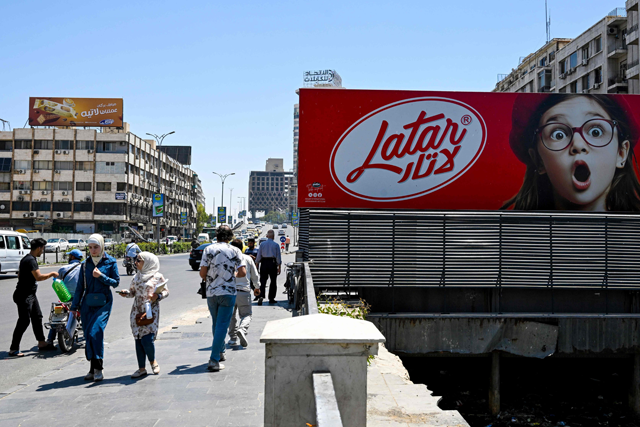You are here
Syrians hope for justice, but face long road ahead
By AFP - May 20,2025 - Last updated at May 20,2025

People walk past a chocolate advertisement in the Syrian capital in Damascus on Tuesday (AFP photo)
BEIRUT, Lebanon — After searching for years for his son and brothers following their arrest and disappearance by Bashar Assad's forces, Syrian real estate broker Maher Al Ton hopes he may finally get justice under the new authorities.
Last week, the government announced the creation of a national commission for missing persons and another for transitional justice.
That, along with the new rulers' arrests of alleged human rights violators linked to the ousted president's government, have made Ton feel hopeful.
"I feel like my son might still be alive," the 54-year-old said.
Assad's forces arrested Ton's son Mohammed Nureddin in 2018 near Damascus when he was just 17 years old, and has not been heard from since.
"I hope justice and fairness will prevail, and that they will reclaim our rights from the Syrian Arab Army which unjustly took our sons," he said, using the since disbanded military's official name.
Rights groups have welcomed the establishment of the justice commissions, but criticised the limiting of their scope to crimes committed by Assad's government.
Syria's war erupted in 2011 with a brutal government crackdown on democracy protesters that saw tens of thousands of people accused of dissent either jailed or killed.
Over time, armed groups emerged to battle Assad's military, including jihadist forces that committed atrocities.
During the war, rights groups accused the Hayat TahrirAl Sham (HTS) group, once affiliated with Al Qaeda, of abuses including unlawful detention and torture.
HTS spearheaded the offensive that ousted Assad in December, and its leaders now form the core of the new government.
DiabSerriya, a co-founder of the Association of Detainees and Missing Persons of Saydnaya Prison, said that while Assad's government was "the biggest perpetrator of human rights violations", that does not "absolve the other parties in the conflict".
The new body, he said, "does not meet the aspirations of victims".
'Criminals'
Syria's new rulers have also arrested several former military and security officials accused of crimes.
This month, the interior ministry announced the arrest of Ghassan Youssef Ali, a doctor, saying he was "one of the officers working at the Tishreen Military Hospital during the era of the former regime".
AFP published in January a report about how detainees were beaten instead of treated at that hospital, the largest military health facility in Damascus.
In April, the security forces detained former intelligence officer Sultan al-Tinawi on accusations of war crimes.
According to Rami Abdel Rahman, head of the Syrian Observatory for Human Rights monitor, "fewer than 10" high-ranking officials have been arrested, with most fleeing the country in the wake of Assad's fall.
Others have gone into hiding in areas of the country that are home to a large Alawite community, whose members stem from the same religious minority as Assad.
Mohammad Al Abdallah, executive director of the Syria Justice and Accountability Centre, said that "there are random arrests of individuals without a plan to search for the missing or to open central investigations into the crime of enforced disappearance, or even to protect mass graves".
Justice is 'essential'
HibaZayadin, senior researcher at Human Rights Watch, agreed.
"There isn't much transparency around what is taking place following these arrests," she said.
Abdallah said there appeared to be "two tendencies: to arrest some individuals, most of them lower-ranking, and to cooperate with other individuals".
Among those who evaded arrest, he said, was FadiSaqr, a former commander in the National Defence Forces, a pro-Assad militia.
Instead, he has joined a committee in the coastal province of Latakia tasked with building bridges between communities divided by years of violence and sectarian conflict.
Transitional justice processes in other parts of the world have been long and painful -- with some countries involving alleged abusers in their new systems to ensure a degree of continuity, and others choosing to turn over a new leaf.
In a report last week, Amnesty International said it was "essential" that those responsible for crimes against humanity, war crimes and torture face justice in fair trials.
"Delaying justice will only heighten the risk of further bloodshed," it added.















